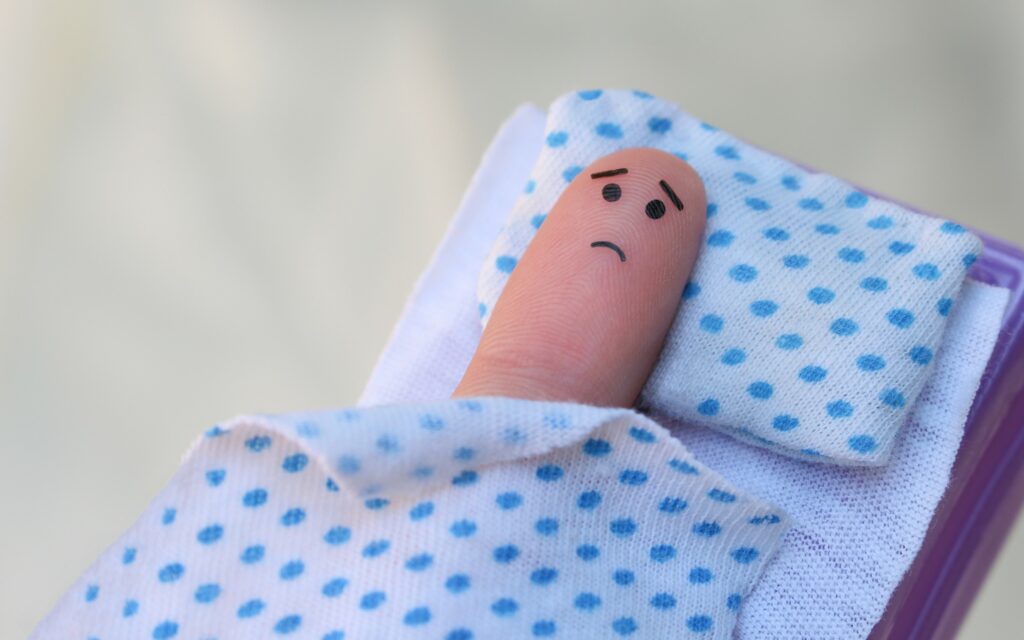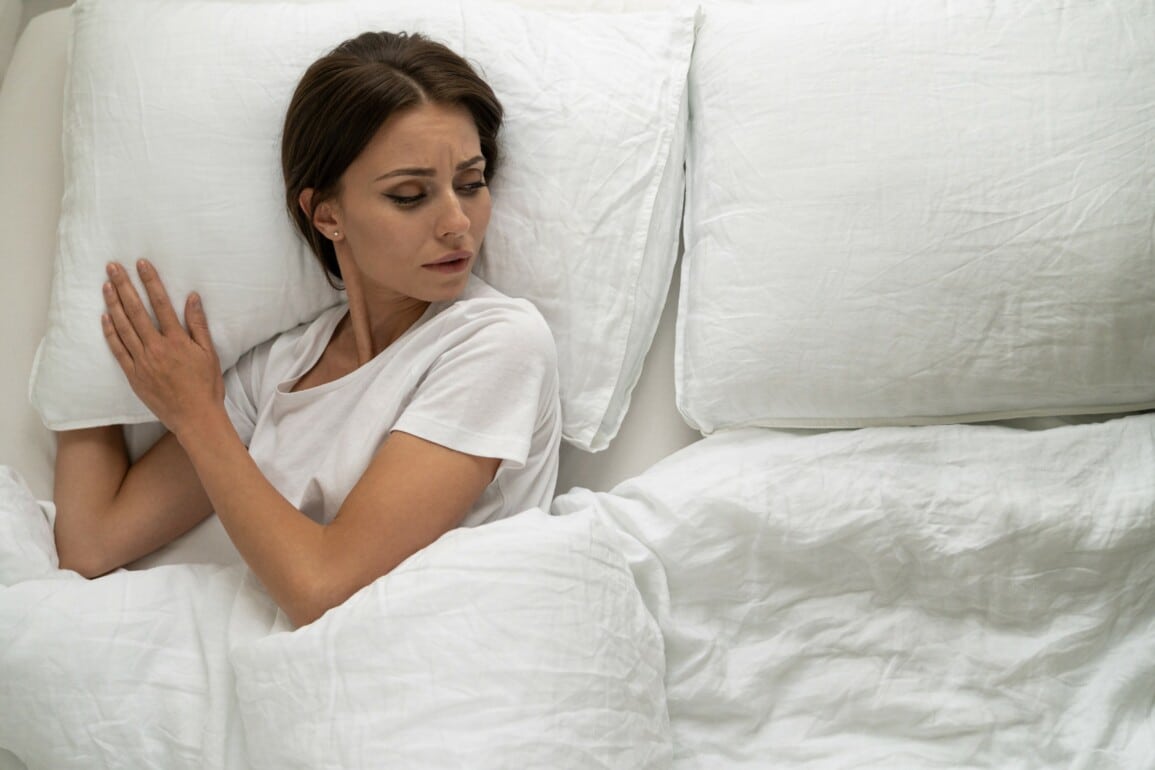Even if you don’t consider yourself to be a particularly cuddly person, it can be difficult to drift off without the presence of your other half also in the bed. You might wonder: “Why can’t I sleep without my boyfriend? “ Rest assured there are countless people who struggle to fall asleep and enjoy a long night of rest without their partner beside them.
So, why is it hard to sleep without your partner? In theory, you should have more space to yourself, fewer chances of people stealing the covers, and less risk of pesky snoring. On the surface, it seems like it should be easier to sleep alone, than with your other half.
However, numerous things can work together to make sleeping without your partner feel practically impossible. Here’s what you need to know about why is it hard to sleep without your partner and how to sleep alone.
Why can’t I sleep when my partner is away?
If you’ve ever Googled “Why do I always sleep better with my boyfriend?” you’re part of a pretty large group of people. According to research from the Better Sleep Council, only 26% of American couples sleep in separate beds to boost their sleeping habits. The rest of us feel as though we often sleep better, when our other half is nearby.
Sleeping next to your partner isn’t just a tradition – it’s a natural human behavior. We’re affectionate creatures who like being close to others – particularly during the night.
Back before we had the homes and security we have today, a sleeping partner would have been a great way to stay safe in an unpredictable environment. It was also a way to share and retain warmth.
Today, sharing a bed with our partner helps us to feel safe and comforted. It can also actively promote better sleep. For instance, researchers in Germany, USA and Denmark found sleeping together allowed couples to achieve greater periods of REM sleep, with fewer sleep interruptions.
Sleeping with a partner can also clue you in if you have a problem like sleep apnea, so you can get help faster. As an extra bonus, cuddling up with your partner releases oxytocin, which provides us with a sense of comfort and relaxation – crucial for a good night’s sleep.
Do you sleep worse without your partner?
If you always sleep better with your partner, there could be a number of reasons why sleeping alone just doesn’t work for you. Some of the most common reasons scientists and psychologists give for the inability to sleep without your partner include:
Fear
One of the most common reasons people struggle to fall asleep without a partner is fear. Some people have a fear of falling asleep, caused by issues like recurring nightmares. Others are fearful something might happen during the night, like a break-in. Having a partner nearby can provide reassurance and quell some fears.
Habit
Some people fall into the habit of sharing a bed with someone else. Our routines make a huge difference to how well we can sleep. If we break these routines, it’s easy to end up suffering from issues with sleeplessness.
Hormones
Snuggling with your loved ones can have a number of benefits, including improved physical and mental health and reduced stress. Cuddling with someone at night releases oxytocin, which promotes relaxation and decreases blood pressure.
Grief
If you’re sleeping alone because of a breakup, the emotions of losing another partner can have a significant impact on your sleep pattern. Sadness and isolation often influence our ability to sleep well.

How to sleep alone: Quick tips
Even if you and your partner are destined to be together forever, there’s a good chance you’re not going to be able to sleep together every night. There’s a chance your partner might be too awake to join you in bed, or they may need to travel somewhere without you.
If you’re temporarily dealing with the stress of sleeping alone, the following tips can help:
Use a body pillow
A body pillow can be an excellent way to replicate some of the comfort of sleeping with a partner. Although your pillow won’t be able to snuggle you in return, it can minimize some of the absence you feel when your other half isn’t there with you.
Body pillows can be as large or small as you need them to be, and they’re surprisingly good at supporting a good night’s sleep. They can even help you to get your body in the perfect position for a good rest if you have joint or muscle pain.
Update your sleep environment
Making your bedroom as relaxing and comfortable as possible without your partner is a good way to minimize your risk of a disruptive night. For instance, you could consider sleeping with a sound machine, if you’re used to hearing the sound of your other half’s breathing to soothe you to sleep.
You could also consider switching to another bed or sleeping in a smaller space, when you’re alone. If you have a spare room with a guest bed, sleeping there instead of in your larger bed when you don’t have your partner with you can make you feel less uncomfortable.
Try a weighted blanket
Just as a body pillow gives you something comforting to snuggle up with at night, a weighted blanket can provide you with a fantastic source of extra comfort when you haven’t got your partner there to hold you. Weighted blankets are designed to mimic the pressure of being held by another human being, so they can help us to feel more supported.
The key to success with a weighted blanket is finding something that’s specifically designed for your body shape and size. This will ensure you can leverage the benefits of deep pressure stimulation, which is thought to increase serotonin and reduce cortisol.
Practice good sleep hygiene
Good sleep hygiene is crucial to getting a good night’s sleep with or without your partner. If you’re struggling to get to sleep when your partner is away, taking steps to improve your sleep hygiene can help.
For instance, spend some extra time working out on the day your partner isn’t going to be available, so you’re more likely to go to bed feeling tired. Use blue-light blocking glasses through the evening to reduce your exposure to stimulating light, and swap your caffeine for relaxing herbal teas.

How to sleep alone after a breakup
Figuring out how to sleep after a breakup can be a little more complex than figuring out how to sleep alone temporarily. Not only are you dealing with a more long-term change in circumstances, but you’re also fighting the symptoms of grief and loss.
A breakup can have a significant impact on both the body and mind, changing your appetite, causing physical aches and pains and even creating the sensation of fatigue. Many people also feel a lot more anxious and stressed, particularly at night when they have less to take their mind off the breakup.
To get your sleeping strategy back on track post-breakup:
Be kind to yourself
Be patient with yourself and don’t expect to feel amazing straight away. Give yourself time to grieve, and try not to worry too much about not following the same sleep pattern you usually would. Think of it as though you’re recovering from an illness; you’ll get back into the right pattern soon enough.
Care for your body and mind
Take steps to protect your body and mind from the effects of grief. Eat nutritious foods when you can and use exercise to access extra feel-good endorphins. Consider looking into methods of meditation to help calm your thoughts.
Find ways to relax
Experiment with different methods of relaxation, whether this means practicing yoga before bed, taking long baths, or just reading your favorite book until you’re ready to fall asleep.
Listen to white noise or audiobooks
Having sound playing in the background when you’re going to sleep can be an excellent way to help quiet your mind if you’re struggling to stop thinking about your breakup.
Journal before bed
Consider journaling all your thoughts so you have a natural way to release some of your emotions before bed.
Can you sleep comfortably alone?
Answering the question, “why can’t I sleep without my boyfriend?” can be complex.
Sleeping alone isn’t always easy, particularly if you’ve grown accustomed to having someone beside you in your bed. However, with a little practice and some of the tips above, you can still have a good night’s sleep, if your partner isn’t around.
It might take a little longer for you to get used to sleeping alone if you’re experiencing the grief and various reactions after a break up. However, try to remember you probably slept alone fine before you got together with your partner, and you will get back into the routine again.
Good luck enjoying sleeping solo.
Siestio. Sleep Matters.
General advice disclaimer
This article contains general tips and advice. However, no diet or exercise program should be started without consulting your physician or other industry professional first. For more information read our full disclaimer here.







